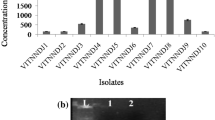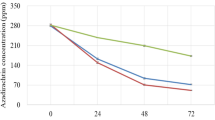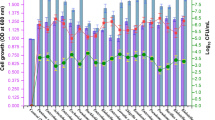Abstract
Acephate is an organophosphorus pesticide used against sucking and biting insects. Although it is not recommended, its residues are found in berries at the time of harvest. The study aimed to explore and identify the bacteria from the grape berry surface which could be applied in the bioremediation of acephate. Accordingly, bacteria AC3 was isolated from the grape berry surface. The bacterium was identified as Kocuria sediminis after 16 S rDNA gene area sequencing. The LC-MS/MS analysis showed that K. sediminis degraded acephate by 61.6% at the concentration of 1ppm, in 7 days. It also showed effective plant growth-promoting activity. The productivity of indole acetic acid (IAA) by K. sediminis after four days of incubation was 57. 60 µg/mL. The present study is the first report that confirmed the role of epiphytic microbes, present on grape berry surface, in the detoxification of pesticides with plant growth-promoting activity.



Similar content being viewed by others
Abbreviations
- IAA:
-
Indole acetic acid.
- MSM:
-
Mineral salt medium.
- MSA:
-
Mineral salt agar.
- SDW:
-
Sterile distilled water.
- NB:
-
Nutrient broth.
- MIC:
-
Minimum Inhibitory Concentration.
- PGPR:
-
Plant growth-promoting rhizobacteria.
- CFU:
-
Colony-forming unit.
- MRM:
-
Multiple reaction monitoring.
- RF:
-
Retention factor.
- NCBI:
-
National Centre for Biotechnology Information.
- BEH:
-
Bridged ethylene hybrid.
- UHPLC:
-
Ultra-high-performance liquid chromatography.
References
Abdul-Baki AA, Anderson JD (1973) Vigor determination in soybean seed by multiple criteria. Crop Sci 13:630–633. https://doi.org/10.2135/cropsci1973.0011183X001300060013x
Andrade GC, Monteiro SH, Francisco JG, Figueiredo LA, Rocha AA, Tornisielo VL (2015) Effects of types of washing and peeling about pesticide residues in tomatoes. J Braz Chem Soc 26:1994–2002. https://doi.org/10.5935/0103-5053.20150179
Bergeys DH, Holt JG (2000) Bergey’s manual of determinative bacteriology, 9th edn. Philadelphia Lippincott Williams & Wilkins
Boethling RS, Alexander M (1979) Microbial Degradation of Organic Compounds at Trace Levels. Environ Sci Technol 13:989–991. https://doi.org/10.1021/es60156a012
Devi R, Thakur R (2018) Screening and identification of bacteria for plant growth-promoting traits from termite mound soil. J Pharmacogn Phytochem 7(2):1681–1686 Corpus ID: 55685621
Dhanushka M, Peiris LD (2017) Cytotoxic and genotoxic effects of acephate on human sperm. J Toxicol 6. https://doi.org/10.1155/2017/3874817
Egli T (2010) How to live at very low substrate concentration. Water Res 44:4826–4827. https://doi.org/10.1016/j.watres.2010.07.023
El-Sayed WS, Akhkha A, El-Naggar MY, Elbadry M (2014) In vitro antagonistic activity, plant growth-promoting traits and phylogenetic affiliation of rhizobacteria associated with wild plants grown in arid soil. Front Microbiol 5:651. https://doi.org/10.3389/fmicb.2014.00651
Gang S, Sharma S, Saraf M, Buck M, Schumacher J (2019) Analysis of Indole-3-acetic Acid (IAA) Production in Klebsiellaby LC-MS/MS and the Salkowski Method. Bio Protoc 9(9):e3230. https://doi.org/10.21769/BioProtoc.3230
Goswami D, Dhandhukia P, Patel P, Thakker JN (2014) Screening of PGPR from the saline desert of Kutch: growth promotion in Arachis hypogea by bacillus licheniformis A2. Microbiol Res 169:66–75. https://doi.org/10.1016/j.micres.2013.07.004
Goswami D, Vaghela H, Parmar S, Dhandhukia P, Thakker JN (2013) Plant growth-promoting potentials of Pseudomonas spp. strain OG isolated from marine water. J Plant Interac 8(4):281–290
Hansda A, Kumar V, Anshumali (2017) Cu-resistant Kocuria sp. CRB15: a potential PGPR isolated from the dry tailing of Rakha copper mine. 3 Biotech 7:132. https://doi.org/10.1007/s13205-017-0757-y
Kumar V, Upadhyay N, Kumar V, Sharma S (2014) A review on sample preparation and chromatographic determination of acephate and methamidophos in different samples. Arab J Chem 8:624–631. https://doi.org/10.1016/j.arabjc.2014.12.007
Lin W, Pang S, Zhou Z, Wu X, Li J, Huang Y, Zhang W, Lei Q, Bhatt P, Mishra S, Chen S (2022) Novel pathway of acephate degradation by the microbial consortium ZQ01 and its potential for environmental bioremediation. J Hazard Mater 426. https://doi.org/10.1016/j.jhazmat.2021.127841
Lorenzini M, Zapparoli G (2020) Epiphytic bacteria from withered grapes and their antagonistic effects on grape-rotting fungi. Int. J. Food Microbiol 319: https://: doi.org/108505.10.1016/j.ijfoodmicro.2019.108505
Maddela NR, Venkateswarlu K (2018) Impact of acephate and buprofezin on soil phosphatases. Insecticides–soil microbiota interactions. Springer, Cham, pp 75–86. https://doi.org/10.1007/978-3-319-66589-4.
Mohan N, Naveena L (2015) solation and Determination of Efficacy of Acephate Degrading Bacteria from Agricultural Soil. IOSR-JESTFT 9(3):2319–2402. https://doi.org/10.9790/2402-09321020
Park S, Kim AL, Hong YK et al (2021) A highly efficient auxin-producing bacterial strain and its effect on plant growth. J Genet Eng Biotechnol 19:179. https://doi.org/10.1186/s43141-021-00252-w
Pinjari AB, Novikov B, Rezenom YH, Russell DH, Wales ME, Siddavattam D (2012) Mineralization of acephate, a recalcitrant organophosphate insecticide is initiated by a pseudomonad in environmental samples. PLoS One 7: e31963.10.1371/journal.pone.0031963
Ramu S, Seetharaman B (2014) Biodegradation of acephate and methamidophos by a soil bacterium Pseudomonas aeruginosa strain Is-6. J Environ Sci Health B 49:23–34. https://doi.org/10.1080/03601234.2013.836868
Ramya SL, Venkatesan T, Murthy KS, Jalali SK, Varghes A (2016) Degradation of acephate by Enterobacter asburiae, Bacillus cereus and Pantoea agglomerans isolated from diamondback moth Plutella xylostella (L), a pest of cruciferous crops. J Environ Biol 37:611–618 PMID: 27498509
Ranade Y, Sawant I, Saha S, Chandrashekar M, Pathak P (2021) Epiphytic Microbial Diversity of Vitis vinifera Fructosphere: Present Status and Potential Applications. Curr Microbiol 78(4):1086–1098. https://doi.org/10.1007/s00284-021-02385-0
Ren J, Wang C, Huhetaoli et al (2020) Biodegradation of acephate by Bacillus paramycoides NDZ and its degradation pathway. World J Microbiol Biotechnol 36:155. https://doi.org/10.1007/s11274-020-02931-1
Salunkhe VP, Sawant IS, Banerjee K, Rajguru YR, Wadkar PN, Oulkar DP, Naik DG, Sawant SD (2013) Biodegradation of profenofos by Bacillus subtilis isolated from grapevines (Vitis vinifera). J. Agric. Food Chem 61: 7195–7202. https://:doi.org10.1021/jf400528d
Salvetti E, Campanaro S, Campedelli I, Fracchetti F, Gobbi A, Tornielli GB, Torriani S, Felis GE (2016) Whole-Metagenome-Sequencing-Based Community Profiles of Vitis vinifera L. cv. Corvina Berries Withered in Two Post-harvest Conditions. Front Microbiol 7:937. https://doi.org/10.3389/fmicb.2016.00937
Sawant IS, Salunkhe VP, Ghule SB, Wadkar PN, Chavan V, Ranade Y, Sawant SD (2019) Induction of resistance in grapevines against powdery mildew by Bacillus strains. Indian phytopath 49(2):107–117
Shinde R, Pardeshi A, Dhanshetty M, Anastassiades M, Banerjee K (2021) Development and validation of an analytical method for the multi-residue analysis of pesticides in sesame seeds using liquid-and gas chromatography with tandem mass spectrometry. J Chromatogr A 462346. DOI: https://doi.org/10.1016/j.chroma.2021.462346
Singh S, Kumar V, Singla S, Sharma M, Singh DP, Prasad R, Thakur VK, Singh J (2020) Kinetic Study of the Biodegradation of Acephate by Indigenous Soil Bacterial Isolates in the Presence of Humic Acid and Metal Ions. Biomolecules 10(3):433. https://doi.org/10.3390/biom10030433
Suliasish W (2020) Sri Isolation of Indole Acetic Acid (IAA) producing Bacillus siamensis from peat and optimization of the culture conditions for maximum IAA production. IOP Conference Series: Environ. Earth Sci. 572: 012025. https://doi.org/10.1088/1755-1315/572/1/012025
Syed JH, Alamdar A, Mohammad A, Ahad K, Shabir Z, Ahmed H, Ali SM, Sani SGAS, Bokhari H, Gallagher KD (2014) Pesticide residues in fruits and vegetables from Pakistan: a review of the occurrence and associated human health risks. Environ Sci Pollut Res 21:13367–13393
Vicene CS, Nascimento F, Espada M, Barbosa P, Mota M, Glick BR, Oliveira S (2012) Characterization of bacteria associated with pinewood nematode Bursaphelenchus xylophilus. PLoS ONE 7:e46661. doi:https://doi.org/10.1371/journal. pone.004666
White JF, Kingsley KL, Verma SK, Kowalski KP (2018) Rhizophagy cycle: an oxidative process in plants for nutrient extraction from symbiotic microbes. Microorganisms 6(3):95. https://doi.org/10.3390/microorganisms6030095
Wirsching J, Pagel H, Ditterich F, Uksa M, Werneburg M, Zwiener C, Berner D, Kandeler E, Poll C (2020) Biodegradation of Pesticides at the Limit: Kinetics and Microbial Substrate Use at Low Concentrations. Front Microbiol 11:2107. https://doi.org/10.3389/fmicb.2020.02107
Ye X, Dong F, Lei X (2018) Microbial Resources and Ecology - Microbial Degradation of Pesticides. Nat Resour Conserv Res 1:22–28
Acknowledgements
The authors would like to thank the Director, ICAR- National Research Centre for Grapes, the Director and Head of school, MIT School of Bioengineering Sciences and Research for their support during the study.
Funding
No funding was received to assist with the preparation of this manuscript.
Author information
Authors and Affiliations
Contributions
Y.R and R.S carried out experimental work. Y.R, S.S, M.C, I.S, and P.P jointly prepared the manuscript. Y.R, S.S, M.C, I.S, R.S, and P.P actively participated in the discussion and revision of the manuscript.
Corresponding author
Ethics declarations
Conflict of interest
The authors declare no conflict of interest.
Additional information
Publisher’s Note
Springer Nature remains neutral with regard to jurisdictional claims in published maps and institutional affiliations.
Electronic supplementary material
Below is the link to the electronic supplementary material.
Rights and permissions
About this article
Cite this article
Ranade, Y.H., Saha, S., Chandrashekar, M. et al. Functionality of fructosphere bacteria Kocuria sediminis strain AC3 in plant growth promotion and biodegradation of the acephate in grape berries. Biologia 77, 3255–3263 (2022). https://doi.org/10.1007/s11756-022-01171-y
Received:
Accepted:
Published:
Issue Date:
DOI: https://doi.org/10.1007/s11756-022-01171-y




